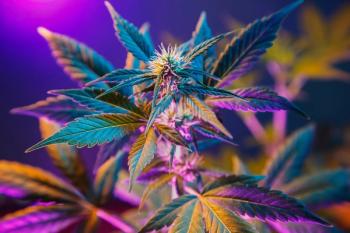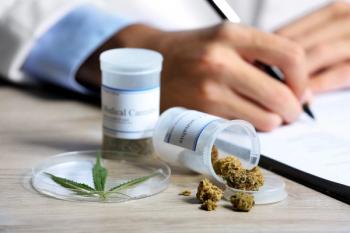
- August 2021
- Volume 2
- Issue 2
Holistic Health Alternatives Offer Patients Other Treatment Plans
Pepper Hernandez, a doctor of naturopathic medicine, board-certified holistic health practitioner, PhD in transpersonal psychology, and the CEO and founder of the Cannabis Holistic Institute, shares her experiences as a medical cannabis patient turned educator.
Pepper Hernandez, a Doctor of Naturopathic Medicine (ND), PhD in transpersonal psychology, board-certified holistic health practitioner, and the CEO and founder of the Cannabis Holistic Institute, has suffered from an epileptic disorder since she was 19 years old. After a cancer scare, Hernandez turned to cannabis and it blossomed into a learning experience to treat her health conditions using the medicinal plant. The cannabis plant treated her epileptic disorder, anxiety, post-traumatic stress disorder (PTSD), and other ailments. From her personal interest, Hernandez delved into researching the different cannabinoids, terpene profiles, and other cannabis benefits to not only help herself understand but to educate others as well. From those experiences as a medical cannabis patient, Hernandez set out to educate others in the healthcare field and general public to show that the stigma surrounding cannabis is unfounded.
Starting at the age of 19, Pepper Hernandez was diagnosed with an epileptic disorder, but she wasn’t familiar with seeking cannabis as a medical treatment option. It wasn’t until a cancer scare years later that the idea of using medical cannabis was sparked. There was a grapefruit-sized tumor attached to her left ovary, affecting her hormones. As a naturopath, Hernandez began reaching out to organic cannabis farmers and other medical cannabis experts to treat her seizure disorder, tumor, anxiety, and post-traumatic stress disorder (PTSD). Through their help and guidance, as well as her own research, she dove into it headfirst by focusing on the profile of the plant and how it works with body systems.
“I was looking at terpene-cannabinoid combination which create a profile and connected it with the body’s system–not just the element or discomfort, but the body system which created those different discomforts. That’s what I still do today. It’s more well-known now, but quite a few years ago, it was absolutely unheard of,” said Hernandez. “People just were not on that spectrum of thinking. I’m really into helping with craft cannabis, helping artisanal farmers create and protect their strains and cultivars, and matching them with physical ailments and discomforts.”
As a seizure and epileptic survivor, Pepper thrives on being more in control over her body. She emphasized how having a seizure, panic attack, or anxiety, are out of control experiences. “I wasn’t interested in ever using cannabis or even using any other kind of natural medicines that were psychedelic,” said Hernandez. “But when I started really understanding that only the THC, not THCA, was the one that gave the alteration, I was able to start breaking down the different terpenes and recognizing CBD, CBG, and all of these other cannabinoids are actually good for the nervous system. I can do this without feeling altered. It really was just about a decade ago when I started using cannabis—around 2012—in a medicinal way.”
Hernandez explained that she never thought cannabis was a bad thing, but she didn’t have use for it in her life until it her medical scare. The benefits of medical cannabis led Hernandez to become a board-certified holistic health practitioner and also the first person in California to hold the title of Cannabis Health Consultant. Through attending a year-long program that was offered in Northern California, she gained further education targeted for physicians and practitioners on how to use cannabis in a healing way. “It paralleled with the time-frame of my cancer scare, which was serendipitous,” she explained.
The program Hernandez found was taught by a group of amazing local women in the Humboldt County, California community who were legacy farmers and knew the plant in a different way. Hernandez explained that the legacy farmers had been growers for generations and were much more aware of the beneficial medicinal purposes than information she had encountered through Google research. The information Hernandez gathered through their curriculum truly touched her heart and inspired her to continue making the six-hour drive, once a month, for the year-long program. During her time there, she utilized the farmers’ knowledge and advice to heal herself as well. From this endeavor, Hernandez was inspired to create the Cannabis Holistic Institute (1), an educational resource which instructs healthcare professionals on medical cannabis.
Crossing the Bridge from Allopathic Medicine to Naturopathic Medicine
As a practicing naturopath, Hernandez likes to recommend natural medicine alternatives, such as cannabis, for patients seeking assistance with their various ailments. Over the course of her practice, she has seen patients coming over from allopathic medicine and having wonderful results with cannabis. Hernandez believes that finding the right combination is the key to success in treating their health conditions. “It has to be exactly the right combination for them. That’s why an educated consultant is best to speak with before even trying cannabis,” she stated.
Hernandez was honest in sharing that medical cannabis has not worked for a small percentage of patients coming from traditional medicine. She reasons that as medical cannabis is a journey through trial and error—patients must be aware of the cannabis profile, terpenes, cannabinoids, usage, amounts, and application methods. All of these things play a role in how cannabis can work for you. Medical cannabis needs to be taken along the same lines of how a medical allopathic physician walks a patient through their prescription medication. When a patient doesn’t feel that cannabis is working for them, often times this is due to the patient not finding the right profile for them or they did not give the plant enough time to see if it’s working. Every medical cannabis patient needs a team and that team can consist of an allopathic physician, naturopathic physician, and a cannabis professional. Hernandez believes that by having a supportive team, there will be greater success for the patient.
To begin treating an interested medical cannabis patient, Hernandez has them fill out an extensive intake form and sit down for a consultation. Prior to treatment, she wants to know as much as she can about the patient, for example, the food they’re consuming, physical activity, emotional stress occurring at home or in their workplace, and so forth. Everything from mental, physical, spiritual, and emotional well being are considered during their course of treatment. If Hernandez has questions, she is able to consult with the board of the Cannabis Holistic Institute to help her navigate through the different types of medications she might not be as familiar with. “We cross-reference all things—including supplements and medications. We have a big team that we work with,” she said “Then we look at the different terpenes and cannabinoid combinations in their state or area that are legal for them to access and use. We might even check into the farms. We might check into the dispensaries for them. We may even call ahead if they are in a legal state that is open and they have access to all of these things.”
After these steps, patients follow their journey through the use of a patient log or journal to document their experiences, and continuously check in with their team for as long as needed, typically until they are balanced with their treatment. Hernandez has found that it is extremely important that the patients’ primary care or prescribing physician be involved with this team because it helps unify the team effort for the best circumstances and outcomes. Hernandez never takes on more than she can handle and prefers hands on involvement. “I know how hard it was for me for the last 20 years to find something. If I can help people shift and navigate through that process easily, it’s the most wonderful thing that you could possibly do for someone,” Hernandez added.
Health Education Through Cannabis
Through the Cannabis Holistic Institute, Hernandez has the opportunity to offer educational information on the benefits of cannabis to medical professionals and holistic healers, helping to eliminate any false material and grow the cannabis community. At first, the institute was just for Humboldt County. A few years after its’ creation, people from all over the country began inquiring to join. “We only have 12 students a year because I want to be able to manage everyone and have one on one conversations with every single student,” said Hernandez. “If they have questions or if they need help through their portfolio or their practicum, I want to be there for them. That is my main focus at this time.”
When the world shifted and shut down during the COVID-19 pandemic, Hernandez also had to formulate the program to a virtual setting. During the pandemic, the Cannabis Holistic Institute was able to provide accessibility to individuals from other states and countries. International students now are able to take part as well. Cannabis education has blossomed at the Cannabis Holistic Institute through the option of a virtual setting.
Aside from the Cannabis Holistic Institute, Hernandez also founded the Humboldt Holistic Foundation, which is a nonprofit organization that helps expand and create resources for holistic projects. The organization has funded scholarships for the Cannabis Holistic Institute from the local community. They were able to open the program up to more people such as healers, mothers, and other individuals in the cannabis sphere, aside from just medical professionals.
Last but not least, Hernandez also created and founded Humboldt Joint Discussions which was inspired by some of her students who decided that they wanted to have free conferences in Humboldt County to further educate the community on cannabis. “These conferences are not just for the physicians or the possible educators. We wanted the whole community to be a part of it. The Humboldt Joint Discussions were interviewing people from the whole spectrum with one question in mind and one end goal in mind: that we are all connected back. It was from seed to sale,” she said. “Everybody who was a part of any of those industries were on the platform with the idea that we were going to educate the patient through that discussion while our local public was able to watch completely for free. The whole entire thing is on a donation basis—from the educators, to the space, to the refreshments for the audience and to the public itself.”
Hernandez’s educational and community charity work doesn’t just stop there. Prior to the pandemic, Hernandez was educating the public all across the country and around the world. “I focused a lot on children education, destigmatizing it for children, and also destigmatizing it for our older elderly population,” she explained. “Helping them softly understand, like there are options that you can use this for and it’s not the thought of the 1970s where you have to be completely altered in order to get the medicinal properties. Those are the two populations that I generally go out to speak for pro bono in my community specifically.”
Her students and graduates from the Cannabis Holistic Institute also provide great educational platforms around the world to help battle the stigma surrounding cannabis and show its medicinal benefits.
Hernandez also shared the unique connection she often has as an educator, especially with elderly audiences. “I think that's what it's all about—it’s connecting with people, helping them recognize you're not selling anything. You're not trying to get them to do anything. You're really just there to educate them because you're passionate about it. With that mindset, you can really help anyone come to terms with how cannabis can help them,” she said.
An Eye to the Future: Closing Thoughts
Medical cannabis use and acceptance is on the rise now due to the hard work and dedication from individuals like Hernandez, who are taking action to help eliminate the stigma surrounding cannabis and highlight its’ healing properties. Over time, Hernandez hopes that cultivators can grow cannabis organically, artisanally, and grow small craft cannabis. On the medical side, she hopes that medical professionals will seek more education about cannabis. There needs to be constant empowerment to learn more so that they can take that information back to their patients. Budtenders and dispensaries also can benefit from further education because they need to be dialed in to the profiles they are providing their customers. Finally, Hernandez hopes that consultants become more involved in their patients care. If they are able to bridge all individuals providing care to a patient, there will be success. “I would love to see a world where we’re really growing specific plants for the our ailments in our community. For example, imagine a community garden and the cultivators are growing for that particular population,” she said “I know that’s a long way off and maybe more for small communities. But as medical professionals, we can encourage that. As consultants, we can encourage diving in and looking at profiles for particular body ailments and disease discomforts.”
While inspiring others through the Cannabis Holistic Institute and her other platforms, it's certain that Hernandez will also continue to educate the masses on the wonders of the cannabis plant.
Reference
Articles in this issue
over 4 years ago
August 2021 Digital Editionover 4 years ago
Medical Cannabis and Caregiver Rights in Hawaiiover 4 years ago
Charlotte Figi: Patient, Advocate, Trailblazer, and Much Moreover 4 years ago
Cannabis Becomes One Nurse’s Tool to Treat Epilepsy DisordersNewsletter
Unlock the latest breakthroughs in cannabis science—subscribe now to get expert insights, research, and industry updates delivered to your inbox.




